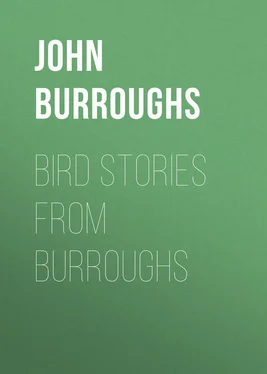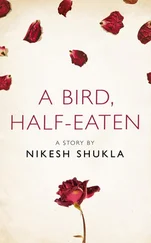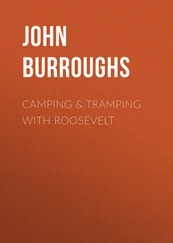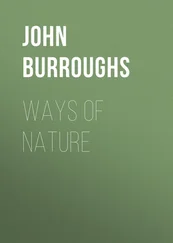John Burroughs - Bird Stories from Burroughs
Здесь есть возможность читать онлайн «John Burroughs - Bird Stories from Burroughs» — ознакомительный отрывок электронной книги совершенно бесплатно, а после прочтения отрывка купить полную версию. В некоторых случаях можно слушать аудио, скачать через торрент в формате fb2 и присутствует краткое содержание. Жанр: foreign_antique, foreign_prose, на английском языке. Описание произведения, (предисловие) а так же отзывы посетителей доступны на портале библиотеки ЛибКат.
- Название:Bird Stories from Burroughs
- Автор:
- Жанр:
- Год:неизвестен
- ISBN:нет данных
- Рейтинг книги:4 / 5. Голосов: 1
-
Избранное:Добавить в избранное
- Отзывы:
-
Ваша оценка:
- 80
- 1
- 2
- 3
- 4
- 5
Bird Stories from Burroughs: краткое содержание, описание и аннотация
Предлагаем к чтению аннотацию, описание, краткое содержание или предисловие (зависит от того, что написал сам автор книги «Bird Stories from Burroughs»). Если вы не нашли необходимую информацию о книге — напишите в комментариях, мы постараемся отыскать её.
Bird Stories from Burroughs — читать онлайн ознакомительный отрывок
Ниже представлен текст книги, разбитый по страницам. Система сохранения места последней прочитанной страницы, позволяет с удобством читать онлайн бесплатно книгу «Bird Stories from Burroughs», без необходимости каждый раз заново искать на чём Вы остановились. Поставьте закладку, и сможете в любой момент перейти на страницу, на которой закончили чтение.
Интервал:
Закладка:
Another April bird whose memory I fondly cherish is the phœbe-bird, the pioneer of the flycatchers. In the inland farming districts, I used to notice him, on some bright morning about Easter Day, proclaiming his arrival, with much variety of motion and attitude, from the peak of the barn or hay-shed. As yet, you may have heard only the plaintive, homesick note of the bluebird, or the faint trill of the song sparrow; and the phœbe's clear, vivacious assurance of his veritable bodily presence among us again is welcomed by all ears. At agreeable intervals in his lay he describes a circle or an ellipse in the air, ostensibly prospecting for insects, but really, I suspect, as an artistic flourish, thrown in to make up in some way for the deficiency of his musical performance. If plainness of dress indicates powers of song, as it usually does, the phœbe ought to be unrivaled in musical ability, for surely that ashen-gray suit is the superlative of plainness; and that form, likewise, would hardly pass for a "perfect figure" of a bird. The seasonableness of his coming, however, and his civil, neighborly ways, shall make up for all deficiencies in song and plumage.
The phœbe-bird is a wise architect and perhaps enjoys as great an immunity from danger, both in its person and its nest, as any other bird. Its modest ashen-gray suit is the color of the rocks where it builds, and the moss of which it makes such free use gives to its nest the look of a natural growth or accretion. But when it comes into the barn or under the shed to build, as it so frequently does, the moss is rather out of place. Doubtless in time the bird will take the hint, and when she builds in such places will leave the moss out. I noted but two nests the summer I am speaking of: one in a barn failed of issue, on account of the rats, I suspect, though the little owl may have been the depredator; the other, in the woods, sent forth three young. This latter nest was most charmingly and ingeniously placed. I discovered it while in quest of pond-lilies, in a long, deep, level stretch of water in the woods. A large tree had blown over at the edge of the water, and its dense mass of upturned roots, with the black, peaty soil filling the interstices, was like the fragment of a wall several feet high, rising from the edge of the languid current. In a niche in this earthy wall, and visible and accessible only from the water, a phœbe had built her nest and reared her brood. I paddled my boat up and came alongside prepared to take the family aboard. The young, nearly ready to fly, were quite undisturbed by my presence, having probably been assured that no danger need be apprehended from that side. It was not a likely place for minks, or they would not have been so secure.
When buckets shine 'gainst maple trees
And drop by drop the sap doth flow,
When days are warm, but still nights freeze,
And deep in woods lie drifts of snow,
When cattle low and fret in stall,
Then morning brings the phœbe's call,
"Phœbe,
Phœbe, phœbe," a cheery note,
While cackling hens make such a rout.
When snowbanks run, and hills are bare,
And early bees hum round the hive,
When woodchucks creep from out their lair
Right glad to find themselves alive,
When sheep go nibbling through the fields,
Then Phœbe oft her name reveals,
"Phœbe,
Phœbe, phœbe," a plaintive cry,
While jack-snipes call in morning sky.
When wild ducks quack in creek and pond
And bluebirds perch on mullein-stalks,
When spring has burst her icy bond
And in brown fields the sleek crow walks,
When chipmunks court in roadside walls,
Then Phœbe from the ridgeboard calls,
"Phœbe,
Phœbe, phœbe," and lifts her cap,
While smoking Dick doth boil the sap.
THE COWBIRD
The cow blackbird is a noticeable songster in April, though it takes a back seat a little later. It utters a peculiarly liquid April sound. Indeed, one would think its crop was full of water, its notes so bubble up and regurgitate, and are delivered with such an apparent stomachic contraction. This bird is the only feathered polygamist we have. The females are greatly in excess of the males, and the latter are usually attended by three or four of the former. As soon as the other birds begin to build, they are on the qui vive , prowling about like gypsies, not to steal the young of others, but to steal their eggs into other birds' nests, and so shirk the labor and responsibility of hatching and rearing their own young.
The cowbird's tactics are probably to watch the movements of the parent bird. She may often be seen searching anxiously through the trees or bushes for a suitable nest, yet she may still oftener be seen perched upon some good point of observation watching the birds as they come and go about her. There is no doubt that, in many cases, the cowbird makes room for her own illegitimate egg in the nest by removing one of the bird's own. I found a sparrow's nest with two sparrow's eggs and one cowbird's egg, and another egg lying a foot or so below it on the ground. I replaced the ejected egg, and the next day found it again removed, and another cowbird's egg in its place. I put it back the second time, when it was again ejected, or destroyed, for I failed to find it anywhere. Very alert and sensitive birds, like the warblers, often bury the strange egg beneath a second nest built on top of the old. A lady living in the suburbs of an Eastern city heard cries of distress one morning from a pair of house wrens that had a nest in a honeysuckle on her front porch. On looking out of the window, she beheld this little comedy, – comedy from her point of view, but no doubt grim tragedy from the point of view of the wrens: a cowbird with a wren's egg in its beak running rapidly along the walk, with the outraged wrens forming a procession behind it, screaming, scolding, and gesticulating as only these voluble little birds can. The cowbird had probably been surprised in the act of violating the nest, and the wrens were giving her a piece of their minds.
Every cowbird is reared at the expense of two or more song-birds. For every one of these dusky little pedestrians there amid the grazing cattle there are two or more sparrows, or vireos, or warblers, the less. It is a big price to pay, – two larks for a bunting, – two sovereigns for a shilling; but Nature does not hesitate occasionally to contradict herself in just this way. The young of the cowbird is disproportionately large and aggressive, one might say hoggish. When disturbed, it will clasp the nest and scream and snap its beak threateningly. One was hatched out in a song sparrow's nest which was under my observation, and would soon have overridden and overborne the young sparrow which came out of the shell a few hours later, had I not interfered from time to time and lent the young sparrow a helping hand. Every day I would visit the nest and take the sparrow out from under the potbellied interloper, and place it on top, so that presently it was able to hold its own against its enemy. Both birds became fledged and left the nest about the same time. Whether the race was an even one after that, I know not.
THE CHIPPING SPARROW
When the true flycatcher catches a fly, it is quick business. There is no strife, no pursuit, – one fell swoop, and the matter is ended. Now note that yonder little sparrow is less skilled. It is the chippy, and he finds his subsistence properly in various seeds and the larvæ of insects, though he occasionally has higher aspirations, and seeks to emulate the pewee, commencing and ending his career as a flycatcher by an awkward chase after a beetle or "miller." He is hunting around in the grass now, I suspect, with the desire to indulge this favorite whim. There! – the opportunity is afforded him. Away goes a little cream-colored meadow-moth in the most tortuous course he is capable of, and away goes Chippy in pursuit. The contest is quite comical, though I dare say it is serious enough to the moth. The chase continues for a few yards, when there is a sudden rushing to cover in the grass, – then a taking to wing again, when the search has become too close, and the moth has recovered his wind. Chippy chirps angrily, and is determined not to be beaten. Keeping, with the slightest effort, upon the heels of the fugitive, he is ever on the point of halting to snap him up, but never quite does it; and so, between disappointment and expectation, is soon disgusted, and returns to pursue his more legitimate means of subsistence.
Читать дальшеИнтервал:
Закладка:
Похожие книги на «Bird Stories from Burroughs»
Представляем Вашему вниманию похожие книги на «Bird Stories from Burroughs» списком для выбора. Мы отобрали схожую по названию и смыслу литературу в надежде предоставить читателям больше вариантов отыскать новые, интересные, ещё непрочитанные произведения.
Обсуждение, отзывы о книге «Bird Stories from Burroughs» и просто собственные мнения читателей. Оставьте ваши комментарии, напишите, что Вы думаете о произведении, его смысле или главных героях. Укажите что конкретно понравилось, а что нет, и почему Вы так считаете.












